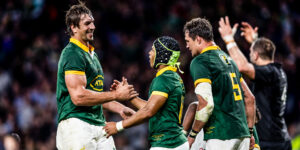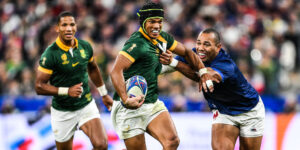Springbok coach Jacques Nienaber has shown faith in his match-winning Rugby World Cup quarter-final squad by retaining the same starting XV and replacements’ bench for Saturday’s semi-final against England at the Stade de France in Paris.
The selection is the most experienced in Springbok history – with a combined total of 895 caps – with 15 of the 23 having played against England in the 32-12 victory in the RWC final four years ago in Japan when the Boks lifted the Webb Ellis Cup for the third time.
It is also only the second time that Nienaber (and director of rugby, Rassie Erasmus) named an identical line-up in 64 Tests since they took charge of the team in 2018. The only other occasion was in the opening match of the 2019 tournament, which was lost 13-23 to New Zealand.
Nienaber opted for the same squad following the performance in the quarter-final against France last week in Paris when the starting team laid a solid foundation, while the bench made a significant impact to edge the match 29-28 for a place in the semi-final.
Manie Libbok and Cobus Reinach will control play at halfback, with centres Damian de Allende and Jesse Kriel returning with a back three of Cheslin Kolbe, Kurt-Lee Arendse and Damian Willemse.
Steven Kitshoff, Frans Malherbe and Bongi Mbonambi will pack down in the front row, with locks Eben Etzebeth and Franco Mostert behind them, and the loose trio of Bok skipper Siya Kolisi, Pieter-Steph du Toit and Duane Vermeulen completing the forward pack.
The replacements’ bench features forwards Deon Fourie (hooker / flanker), Ox Nche and Vincent Koch (props), RG Snyman (lock), Kwagga Smith (loose forward), and three backs in Faf de Klerk (scrumhalf), Handre Pollard (flyhalf), and Willie le Roux (fullback).

“We’ve been building a quality Rugby World Cup squad for the last few years so that we could be in this position going into the knockout matches,” said Nienaber.
“We have a squad of 33 players, all of whom are very closely matched in terms of their skill and quality of play which made it tempting to make changes this week and it was tough to select this group both last week and this week. But we feel it’s now time to go with the players in the squad who we believe are in their best form.”
Nienaber noted that eight of the team started against England in the 2019 final (Kolisi, Du Toit, Vermeulen, Mbonambi, Etzebeth, Malherbe, De Allende and Kolbe) while another seven other players from that match are also in the 23 (starting forwards Mostert and Kitshoff, as well as back replacements Le Roux, Pollard and De Klerk, and forward replacements Snyman and Koch).
“This may not have much significance, but the fact remains that these players have been here before, and they know what it will take to defeat a top-quality team such as England,” said Nienaber.
“Competition for places in the team is very tight and the coaches had a few in depth discussions before finalising the team.
“We have players like Lukhanyo Am, Canan Moodie, Andre Esterhuizen, Jasper Wiese, Jean Kleyn, and the list goes on, who are all good enough to be in this team and would have fitted in and done the job just well as the other players.
“But we can only select 23 and everyone in this group is aligned and understands that the country comes first,” said Nienaber.
“We are playing for our friends, family and the 60 million people at home who have been supporting us through thick and thin and we are determined to continue giving them hope and something to smile about.”

Nienaber said he expected a humdinger of a challenge from England: “They come off five victories in a row and they are high on confidence. They have a quality pack and world-class backs who can create magic on the field, and those who are writing them off are making a major mistake.
“Like us, they are one game away from a World Cup final and we’ve seen through the history of the tournament that England raise their game for these matches. If we lose, we have to play the third-place playoff – which no team wants to do.
“We are closely matched in terms of average player age and caps, both teams are used to playing on the biggest stage. This is do-or-die if either of wants to the lift the trophy next week, so neither side will give an inch.”
Springbok team to face England in Paris:
15 – Damian Willemse (DHL Stormers) – 37 caps, 56 pts (4t, 9c, 4p, 2d)
14 – Kurt-Lee Arendse (Vodacom Bulls) – 13 caps, 65 pts (13t)
13 – Jesse Kriel (Canon Eagles) – 66 caps, 75 pts (15t)
12 – Damian de Allende (Wild Knights) – 76 caps, 55 pts (11t)
11 – Cheslin Kolbe (Suntory Sungoliath) – 29 caps, 91 pts (14t, 3c, 5p)
10 – Manie Libbok (DHL Stormers) – 13 caps, 84 pts (1t, 26c, 9p)
9 – Cobus Reinach (Montpellier) – 30 caps, 60 pts (12t)
8 – Duane Vermeulen (SA Rugby) – 74 caps, 15 pts (3t)
7 – Pieter-Steph du Toit (Toyota Verblitz) – 74 caps, 40 pts (8t)
6 – Siya Kolisi (captain, Racing 92) – 81 caps, 50 pts (10t)
5 – Franco Mostert (Honda Heat) – 71 caps, 15 pts (3t)
4 – Eben Etzebeth (Hollywoodbets Sharks) – 117 caps, 30 pts (6t)
3 – Frans Malherbe (DHL Stormers) – 67 caps, 5pts (1t)
2 – Bongi Mbonambi (Hollywoodbets Sharks) – 66 caps, 65pts (13t)
1 – Steven Kitshoff (Ulster) – 81 caps, 10 pts (2t)
Replacements:
16 – Deon Fourie (DHL Stormers) – 11 caps, 10 pts (2t)
17 – Ox Nche (Hollywoodbets Sharks) – 26 caps, 0 pts
18 – Vincent Koch (Hollywoodbets Sharks) – 48 caps, 0pts
19 – RG Snyman (Munster) – 32 caps, 5pts (1t)
20 – Kwagga Smith (Shizuoka Blue Revs) – 38 caps, 35 pts (7t)
21 – Faf de Klerk (Canon Eagles) – 53 caps, 48 pts (5t, 4c, 5p)
22 – Handre Pollard (Leicester Tigers) – 68 caps, 678 pts (7T, 95C, 146P, 5D)
23 – Willie le Roux (Vodacom Bulls) – 91 caps, 75 pts (15t)
Stats and facts:
Springbok record against England:
Played: 45; Won 27; Lost 16; Drawn 2; Points for 972; Points against 769; Tries scored: 88; Tries against: 58; Highest score: 58-10; Biggest win 48 points. Win percentage 60%.
Milestones:
- It will be Eben Etzebeth’s 11th Test match against England, joining Tendai Mtawarira, John Smit and Joost van der Westhuizen all in second place. Four other Springboks are on a record 12 career caps against England.
- The loose trio of Siya Kolisi, Pieter-Steph du Toit and Duane Vermeulen will start as combination for the 15th time, putting them alone in second place on the list behind Francois Louw, Willem Alberts and Vermeulen (17).
- Eben Etzebeth and Franco Mostert will move into third place on the list of lock combinations with their 26th start as second row partners, behind Victor Matfield and Bakkies Botha (63), and Etzebeth and Lood de Jager (39).
Miscellaneous:
- Handré Pollard has scored seven conversions (second place) in his six appearances against England but holds the record with 19 penalty goals.
- Saturday’s semi-final is the sixth RWC clash between the Boks and England. South Africa won in the 1999 quarter-final (44-21) in Paris; the pool game (36-0) and final (15-6) in 2007, both in Paris; and the final (32-12) in Yokohama in 2019. England won the pool game in Perth in 2003 (25-6).
- Kurt-Lee Arendse starts the match with a full-house of tries, with 13 five-pointers in in 13 Tests to date.
- This will be the fourth time the Springboks and England clash in a Rugby World Cup match in Paris, after the playoff in 1999 and two encounters in 2007.
- England have scored just one try across their five meetings with South Africa in the RWC – during their 25-6 pool win in 2003.
- South Africa (8.0) and England (8.6) have conceded fewer penalties per game than any other sides to have reached the semi-finals of this year’s Rugby World Cup, with only France and Japan (7 each) averaging fewer overall.
- The Springbok starting team on Saturday will be the most experienced ever selected for South Africa with a combined total of 895 Test caps – four more than the 891 against Samoa in Birmingham in 2015.
- There are 264 caps in the backline, with 631 caps among the forwards. On the bench there are a further 367 caps.
- The average caps per player in the backline is 37, the forwards 78, while the players on the bench average 45.

